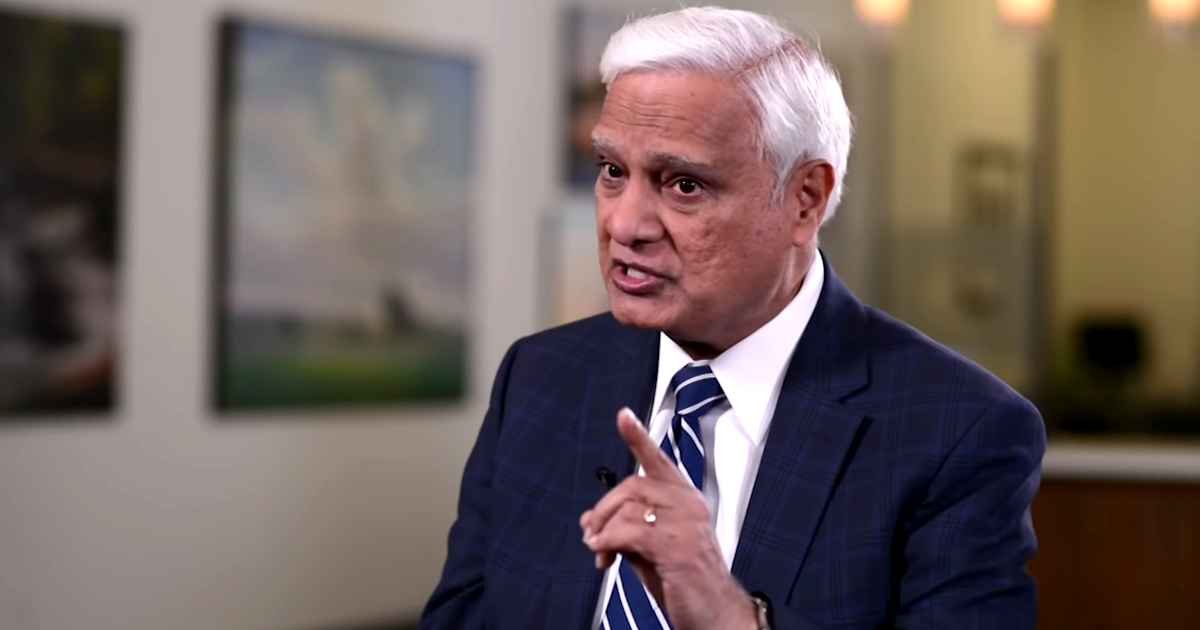Faith can move mountains. When Jesus spoke these words, He revealed a powerful truth about faith’s ability to accomplish what seems impossible.
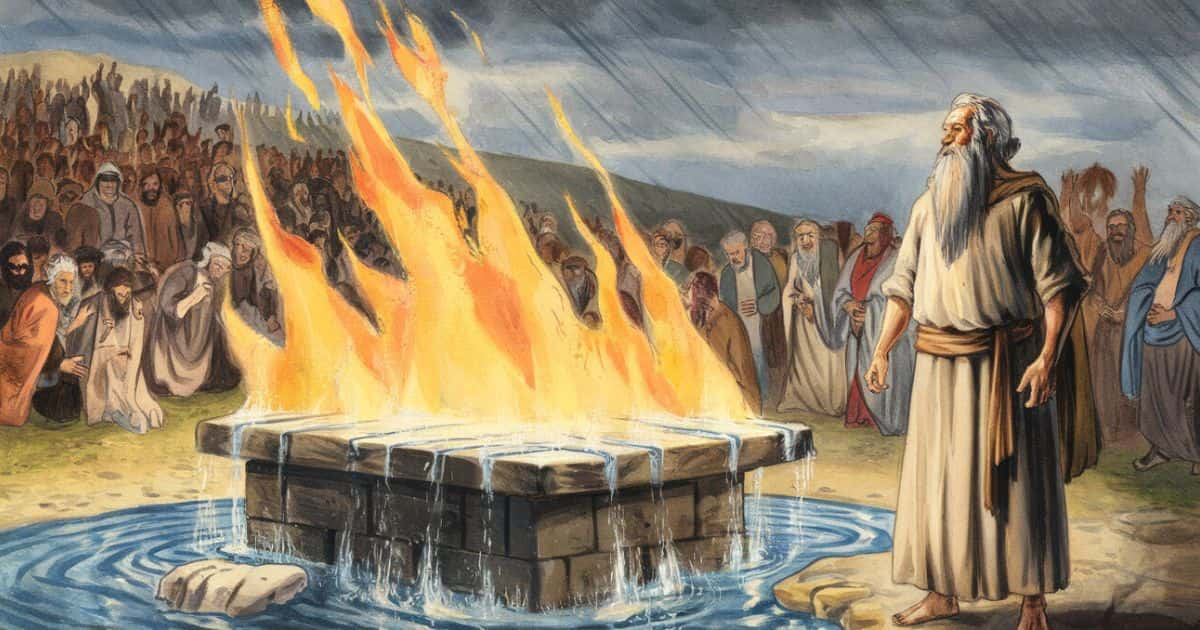
Throughout Scripture, we find remarkable stories of people whose faith led to extraordinary miracles. These accounts show us how God responds when His people trust Him completely, even in seemingly impossible situations. Let’s explore seven powerful examples of mountain-moving faith in the Bible, where ordinary people faced extraordinary challenges and saw God work in miraculous ways.
1. Joshua Commands the Sun to Stand Still
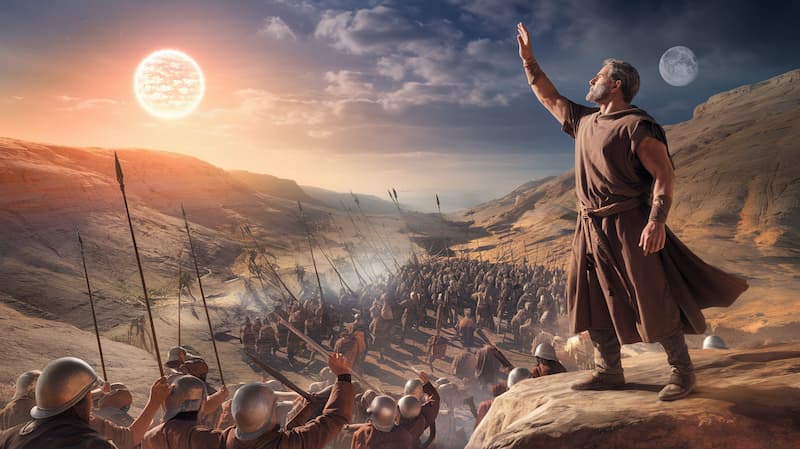
Scripture Reference: Joshua 10:1-15
The background of this incredible story takes us to a crucial moment in Israel’s conquest of the Promised Land. The Gibeonites, who had made peace with Israel, were under attack from five Amorite armies. These armies, led by five kings, had joined forces because they feared Israel’s growing power and were angry at Gibeon’s alliance with Joshua.
The Gibeonites sent an urgent message to Joshua: “Do not abandon your servants. Come up to us quickly and save us! Help us, because all the Amorite kings from the hill country have joined forces against us” (Joshua 10:6).
Joshua faced a significant decision. The Gibeonites had actually tricked Israel into making a peace treaty with them earlier. Yet, because of the oath Israel had made, Joshua was bound to help them. He had to march his army through the night, climbing from Gilgal to Gibeon – a grueling uphill journey of about 3,000 feet in elevation.
The Lord encouraged Joshua, saying, “Do not be afraid of them; I have given them into your hand. Not one of them will be able to withstand you” (Joshua 10:8).
As the battle raged on, Joshua could see that he needed more daylight to complete the victory God had promised. In an astounding act of faith, he spoke to the Lord in front of all Israel: “Sun, stand still over Gibeon, and you, moon, over the Valley of Aijalon” (Joshua 10:12).
The Bible records what happened next in precise detail: “The sun stopped in the middle of the sky and delayed going down about a full day. There has never been a day like it before or since, a day when the Lord listened to a human being” (Joshua 10:13-14).
This incredible miracle came from Joshua’s absolute trust in God’s power and promise. He didn’t hesitate to ask for something humanly impossible because he knew the God he served could do anything.
2. Elijah and the Fire from Heaven
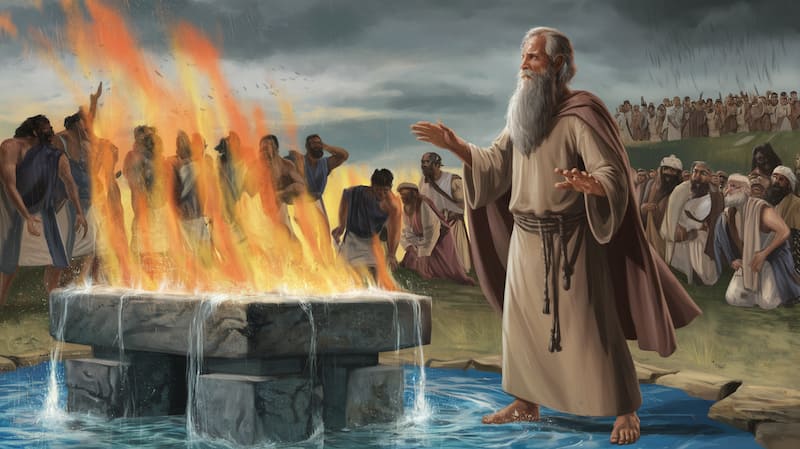
Scripture Reference: 1 Kings 18:16-46
The story of Elijah on Mount Carmel unfolds during one of Israel’s darkest spiritual periods. King Ahab had married Jezebel, a princess of Sidon, who brought Baal worship into Israel.
Under their rule, the worship of the true God had been nearly stamped out. Jezebel had killed many of God’s prophets, and those remaining were hiding in caves.
The spiritual corruption was so severe that God had sent a drought upon the land. For three and a half years, not a drop of rain had fallen in Israel – exactly as Elijah had declared by God’s word.
During this time, Ahab had been searching everywhere for Elijah, whom he blamed for the nation’s troubles.
God commanded Elijah to present himself to Ahab. When they met, Ahab immediately accused him: “Is that you, you troubler of Israel?” Elijah boldly responded, “I have not made trouble for Israel. But you and your father’s family have. You have abandoned the Lord’s commands and have followed the Baals” (1 Kings 18:17-18).
Then Elijah proposed a public test that would once and for all prove who was the true God. He challenged Ahab: “Now summon the people from all over Israel to meet me on Mount Carmel. And bring the four hundred and fifty prophets of Baal and the four hundred prophets of Asherah, who eat at Jezebel’s table” (1 Kings 18:19).
The contest terms were clear: Two bulls would be prepared as sacrifices – one for Baal and one for the Lord. The prophets would lay their bull on wood but use no fire. Elijah would do the same. The God who answered by fire would be proven to be the true God.
From morning until noon, the prophets of Baal called out to their god. They danced around the altar they had made. Nothing happened. By noon, Elijah began to taunt them: “Shout louder! Surely he is a god! Perhaps he is deep in thought, or busy, or traveling. Maybe he is sleeping and must be awakened” (1 Kings 18:27).
The prophets of Baal continued until evening, cutting themselves with swords and spears until their blood flowed, but there was still no response.
Then came Elijah’s turn. First, he restored the broken altar of the Lord, using twelve stones to represent the twelve tribes of Israel. He dug a deep trench around it. He arranged the wood, cut the bull into pieces, and laid it on the wood.
Then he did something extraordinary – he ordered the people to drench the sacrifice, wood, and altar with water three times, until water filled the trench.
At the time of the evening sacrifice, Elijah stepped forward and prayed: “Lord, the God of Abraham, Isaac and Israel, let it be known today that you are God in Israel and that I am your servant and have done all these things at your command. Answer me, Lord, answer me, so these people will know that you, Lord, are God, and that you are turning their hearts back again” (1 Kings 18:36-37).
Immediately, fire fell from heaven. It was so intense that it consumed not just the sacrifice and wood, but also the stones, soil, and even licked up the water in the trench. The people fell prostrate and cried out, “The Lord—he is God! The Lord—he is God!” (1 Kings 18:39).
After this display of God’s power, Elijah had the prophets of Baal seized and executed according to the law of Moses. Then he told Ahab to eat and drink, for rain was coming.
Elijah climbed to the top of Carmel, bent down to the ground, and prayed for rain. After his servant reported seeing a cloud the size of a man’s hand, a heavy rain ended the three-and-a-half-year drought.
3. The Woman with the Issue of Blood
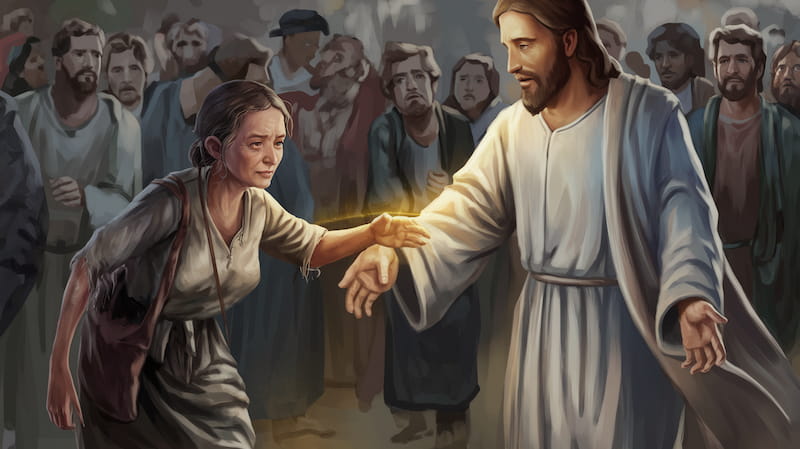
Scripture Reference: Mark 5:25-34, Matthew 9:20-22, Luke 8:43-48
This story introduces us to a woman who had suffered from constant bleeding for twelve years. The Bible gives us several important details about her situation. She had spent all her money on many doctors, but instead of getting better, she grew worse.
Her condition wasn’t just physical – it affected every aspect of her life. According to Jewish law, her bleeding made her ceremonially unclean. This meant she couldn’t participate in worship at the temple. Anyone who touched her would become unclean. She couldn’t have normal social relationships. For twelve years, she had lived as an outcast.
One day, she heard that Jesus was passing through her area. A large crowd pressed around him. Despite her weakness from years of bleeding, despite the risk of making others ceremonially unclean by touching them, despite the possibility of public shame if discovered, she made a decision of faith.
She thought to herself, “If I just touch his clothes, I will be healed” (Mark 5:28). This was extraordinary faith. She didn’t need Jesus to lay hands on her or pray for her. She believed that just touching his garment would be enough.
Making her way through the crowd, she came up behind Jesus and touched the edge of his cloak. Immediately, her bleeding stopped. She could feel in her body that she was freed from her suffering.
At that moment, Jesus stopped. He asked, “Who touched my clothes?” His disciples were puzzled by this question since many people were pressing against him. But Jesus knew that power had gone out from him.
The woman, realizing she couldn’t remain hidden, came trembling and fell at his feet. In front of all the people, she told why she had touched him and how she had been instantly healed.
Instead of rebuking her for making him ceremonially unclean, Jesus said something remarkable: “Daughter, your faith has healed you. Go in peace and be freed from your suffering” (Mark 5:34). Jesus publicly acknowledged her faith and confirmed her healing.
4. Peter Walking on Water
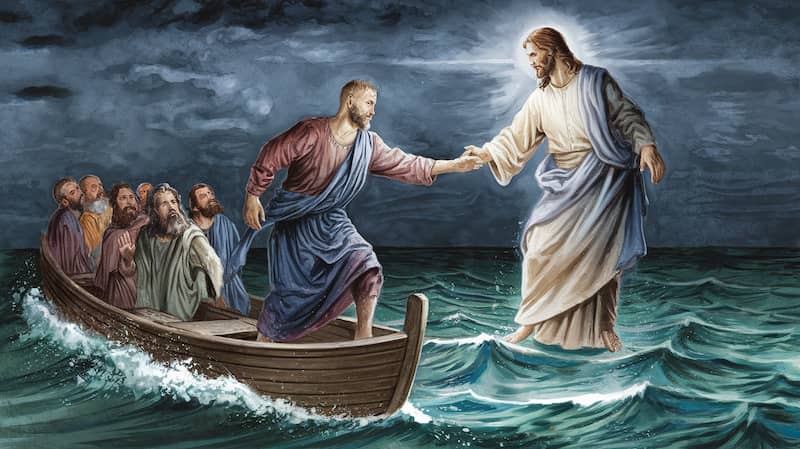
Scripture Reference: Matthew 14:22-33
The setting for this remarkable display of faith took place right after Jesus fed the five thousand. Jesus had just sent his disciples ahead by boat across the Sea of Galilee while He went up on a mountainside to pray alone. As night fell, the situation turned dangerous.
The disciples found themselves in the middle of the lake, fighting against a strong wind. The Bible tells us their boat was “buffeted by the waves because the wind was against it” (Matthew 14:24). These were experienced fishermen who knew the dangers of the Sea of Galilee’s sudden storms.
During the fourth watch of the night – between 3:00 AM and 6:00 AM – Jesus came to them, walking on the water. The disciples were terrified, thinking they were seeing a ghost. Their fear was natural; they had been battling the storm for hours, and now they saw something that seemed impossible.
But then Jesus spoke to them: “Take courage! It is I. Don’t be afraid” (Matthew 14:27). It was at this moment that Peter showed remarkable faith. He responded, “Lord, if it’s you, tell me to come to you on the water” (Matthew 14:28).
When Jesus said “Come,” Peter did something extraordinary. He stepped out of the boat onto the stormy sea. For a few moments, Peter actually walked on water toward Jesus. The same waves that had been threatening the boat were now under Peter’s feet.
However, when Peter took his eyes off Jesus and looked at the wind and waves around him, he began to sink. Even then, his faith showed through. As he started to sink, he cried out, “Lord, save me!” Jesus immediately reached out and caught him.
This story reveals both the power and the human frailty of faith. Peter demonstrated enough faith to attempt the impossible, yet he also showed how quickly doubt can overtake us when we focus on our circumstances rather than on Jesus.
5. The Walls of Jericho Fall by Faith
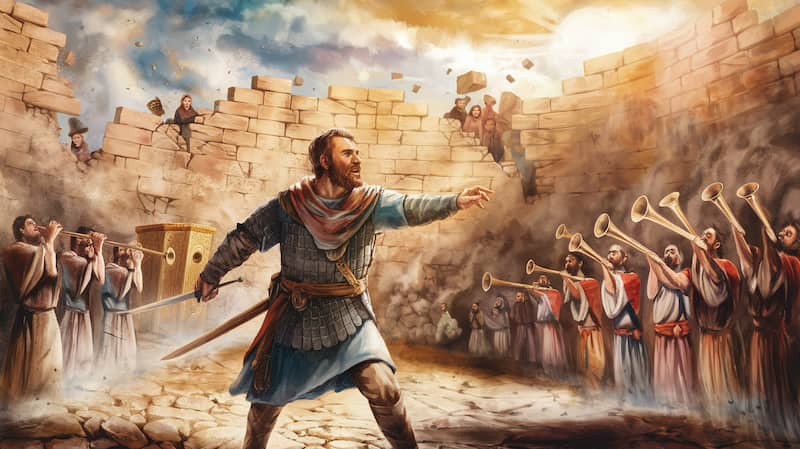
Scripture Reference: Joshua 6:1-27
The conquest of Jericho takes place just after Israel crossed the Jordan River into the Promised Land. Jericho stood as their first major obstacle – a fortified city with walls so thick that people actually lived inside them.
The city was tightly shut up because of fear of the Israelites. No one went in or out. From a military standpoint, conquering such a fortified city would typically require a lengthy siege.
But God gave Joshua unusual instructions: “March around the city once with all the armed men. Do this for six days. Have seven priests carry trumpets of rams’ horns in front of the ark. On the seventh day, march around the city seven times, with the priests blowing the trumpets” (Joshua 6:3-4).
These instructions made no military sense. Yet Joshua and the people demonstrated remarkable faith by following them exactly. For six days, they marched once around the city in complete silence except for the trumpets.
The procession followed a specific order: armed guards in front, seven priests with ram’s horn trumpets, priests carrying the Ark of the Covenant, and a rear guard behind. They did this once each day for six days.
On the seventh day, they rose at daybreak and marched around the city seven times. When the priests sounded the long blast on the trumpets, Joshua commanded the army to shout. When they did, the walls collapsed suddenly and completely.
The Bible records that “the wall fell down flat. Then the people went up into the city, every man straight before him, and they took the city” (Joshua 6:20).
The people’s willingness to follow God’s unusual battle plan demonstrated their trust in His power rather than human military strategy.
6. The Syrophoenician Woman
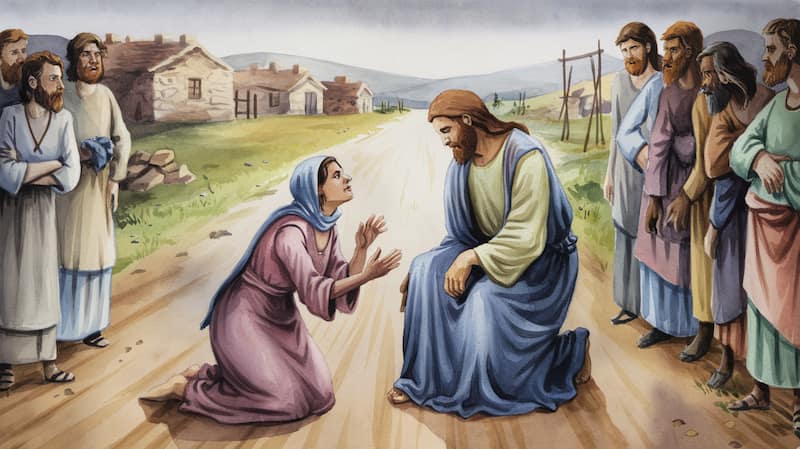
Scripture Reference: Matthew 15:21-28, Mark 7:24-30
This powerful story takes place when Jesus traveled to the region of Tyre and Sidon, an area primarily populated by Gentiles. A local woman, described as a Syrophoenician by birth, came to Jesus with an urgent need – her young daughter was suffering terribly from demon possession.
The woman’s situation was difficult on multiple levels. As a Gentile woman approaching a Jewish teacher, she crossed significant cultural and religious boundaries. The fact that she came alone to speak to a man in public showed her desperation.
When she found Jesus, she cried out, “Lord, Son of David, have mercy on me! My daughter is demon-possessed and suffering terribly” (Matthew 15:22).
Initially, Jesus didn’t answer her at all. The disciples urged him to send her away because she kept crying out after them. Then Jesus spoke words that would have discouraged most people: “I was sent only to the lost sheep of Israel” (Matthew 15:24).
Still, the woman didn’t give up. She came and knelt before Jesus, saying simply, “Lord, help me!” Jesus’ next response seemed even harsher: “It is not right to take the children’s bread and toss it to the dogs” (Matthew 15:26).
Rather than taking offense, the woman showed remarkable faith and humility. She replied, “Yes, Lord, yet even the dogs eat the crumbs that fall from their masters’ table” (Matthew 15:27). Her response acknowledged Jesus’ primary mission to Israel while expressing faith that His power and mercy extended beyond those boundaries.
Jesus was moved by her persistent faith. He told her, “Woman, you have great faith! Your request is granted” (Matthew 15:28). Her daughter was healed at that very moment.
This woman’s faith stood out because it persisted through multiple discouragements. She faced social barriers, apparent rejection, and a seemingly insulting comparison. Yet she held onto her faith in Jesus’ power and mercy, and that faith was rewarded.
7. Daniel Spends Night in Den of Hungry Lions
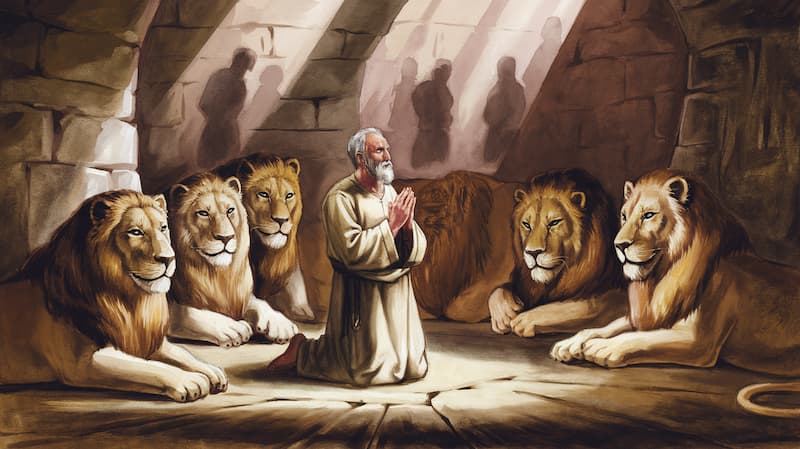
Scripture Reference: Daniel 6:1-28
Daniel’s story of faith takes place during the Persian rule over Babylon. Though a captive in a foreign land, Daniel had risen to a high position through his excellent work. The Bible tells us King Darius planned to place him over the entire kingdom because “an excellent spirit was in him” (Daniel 6:3).
This promotion stirred jealousy among other officials. They knew they couldn’t find any fault in Daniel’s work, so they targeted his faith. These officials convinced King Darius to sign a decree that for thirty days, anyone who prayed to any god or man except the king would be thrown into the lions’ den.
Daniel knew about the decree. The penalty was death, yet he didn’t change his prayer habits. The Bible tells us he went home, opened his windows toward Jerusalem as usual, and prayed three times a day, “giving thanks to his God, just as he had done before” (Daniel 6:10).
Daniel continued his regular prayer practice even knowing his enemies were watching. When they reported him, King Darius was greatly distressed but had to follow his own law.
Before Daniel was thrown into the den, the king said something remarkable: “May your God, whom you serve continually, rescue you!” (Daniel 6:16). Daniel’s consistent faith had impressed even this pagan king.
The next morning, when the king rushed to the den, Daniel’s response showed his faith had been rewarded: “My God sent his angel and shut the lions’ mouths, and they have not harmed me” (Daniel 6:22).
Daniel’s faith not only moved the mountain of impossible circumstances but also led the king to acknowledge the living God.
8. Three Men Walk Unharmed in Blazing Furnace
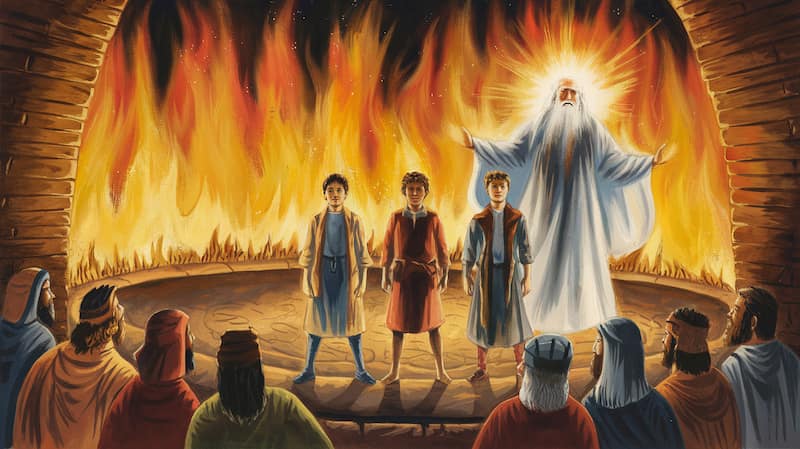
Scripture Reference: Daniel 3:1-30
Shadrach, Meshach, and Abednego faced a terrible choice in Babylon. King Nebuchadnezzar had built a massive golden image and commanded everyone to bow down and worship it when they heard the music play. The penalty for refusing was death in a fiery furnace.
These three young men held high positions in Babylon’s government, but they were first and foremost servants of the living God. When the music played, they remained standing while thousands around them bowed to the ground.
Their accusers quickly reported them to the king. Nebuchadnezzar, furious but still showing some favor because of their good service, offered them a second chance. Their response shows remarkable faith: “Our God whom we serve is able to deliver us from the burning fiery furnace, and He will deliver us from your hand, O king. But if not, let it be known to you, O king, that we do not serve your gods” (Daniel 3:17-18).
This faith was extraordinary because it didn’t depend on God’s rescue. They believed God could save them but would not compromise even if He chose not to. The king, enraged, had the furnace heated seven times hotter than usual.
The furnace was so hot that the soldiers who threw them in died from the heat. But when the king looked in, he saw four men walking in the fire, and “the form of the fourth is like the Son of God” (Daniel 3:25).
When they came out, not even their clothes smelled of smoke. Their faith led to more than personal deliverance – it caused the most powerful king on earth to praise their God.
9. The Widow of Zarephath
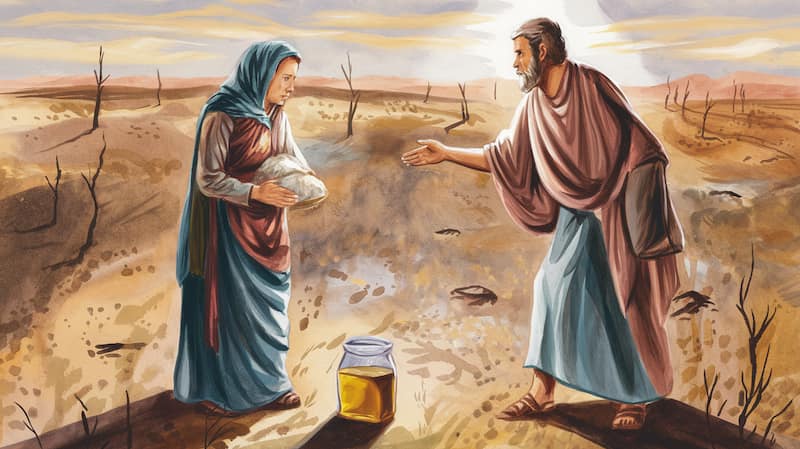
Scripture Reference: 1 Kings 17:8-24
The story of the widow of Zarephath takes place during one of Israel’s darkest periods. King Ahab and Queen Jezebel had led Israel into Baal worship. As judgment, God had sent a severe drought through the prophet Elijah’s word – no rain would fall except at his command.
After the brook Cherith dried up where Elijah had been hiding, God sent him to an unlikely place – Zarephath in Sidon. This was Gentile territory and, ironically, the homeland of Jezebel.
God told Elijah specifically that He had commanded a widow there to feed him.
When Elijah arrived at the town gate, he saw a widow gathering sticks. Her situation was desperate. Severe famine had gripped the land.
The Bible gives us a clear picture of her poverty when Elijah asks her for water and bread. She responds, “As surely as the Lord your God lives, I don’t have any bread—only a handful of flour in a jar and a little olive oil in a jug. I am gathering a few sticks to take home and make a meal for myself and my son, that we may eat it—and die” (1 Kings 17:12).
This was her last meal. As a widow with a dependent son in ancient times, she had no means of support. The drought had taken everything, and she had reached the end of her resources.
Yet Elijah made an extraordinary request: “First make a small loaf of bread for me from what you have and bring it to me, and then make something for yourself and your son” (1 Kings 17:13). Along with this request came a promise: “The jar of flour will not be used up and the jug of oil will not run dry until the day the Lord sends rain on the land” (1 Kings 17:14).
The widow’s faith shines in what she did next. Without hesitation, she went and did exactly as Elijah asked. She took her last bits of flour and oil – meant to be her final meal with her son – and made bread for a stranger first. This wasn’t just sharing from abundance; it was giving everything she had left based on a promise.
True to God’s word, her flour and oil never ran out. Each day when she went to make bread, she found enough in the jar and jug for another day. This miracle sustained not just Elijah, but the widow and her household throughout the drought.
But her story of faith faces an even greater test. Some time later, her son became ill and stopped breathing. In her grief, she went to Elijah, and her words reveal both faith and hurt: “Did you come to remind me of my sin and kill my son?” (1 Kings 17:18).
Elijah took the boy to his upper room and prayed passionately to God. The Lord answered his prayer, and the boy’s life returned to him. When Elijah brought her living son back to her, the widow made a profound declaration of faith: “Now I know that you are a man of God and that the word of the Lord from your mouth is the truth” (1 Kings 17:24).
10. A Roman Centurion’s Faith Amazes Jesus
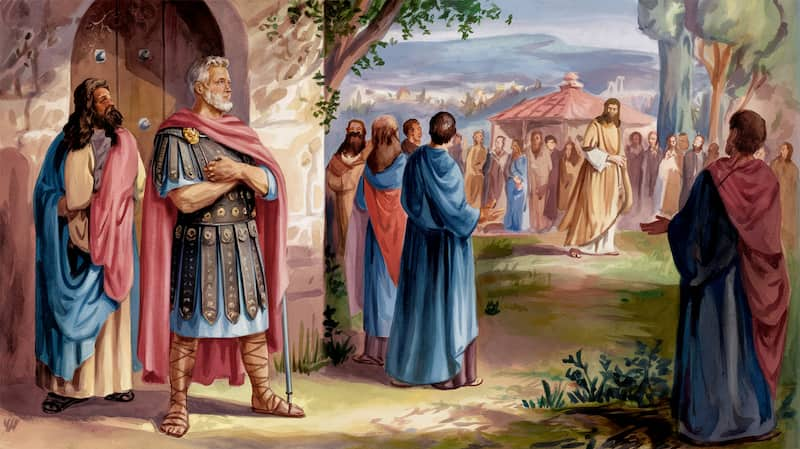
Scripture Reference: Matthew 8:5-13, Luke 7:1-10
The story of the centurion’s faith stands out because it’s one of only two times in Scripture where Jesus is said to have “marveled” at someone’s faith. This Roman military officer served in Capernaum, Jesus’ base during His Galilean ministry.
As a centurion, this man commanded about 100 soldiers in the Roman army. The position required proven leadership and earned significant respect. Roman centurions were known for their discipline, loyalty, and responsibility. They formed the backbone of the Roman military system.
Yet this particular centurion was unusual. Luke’s account tells us the Jewish elders spoke highly of him: “This man deserves to have you do this, because he loves our nation and has built our synagogue” (Luke 7:4-5). For a Roman officer to build a synagogue for Jews showed extraordinary respect for their faith and culture.
The crisis that brought him to Jesus involved his servant who was “paralyzed and in terrible suffering” (Matthew 8:6). Luke adds that this servant was “highly valued” and “close to death” (Luke 7:2). In an age when servants were often treated as disposable property, the centurion’s concern for his servant revealed his character.
The centurion’s approach to Jesus demonstrated both humility and faith. First, he sent Jewish elders to make the request, showing respect for Jewish customs about entering Gentile homes. Then, when Jesus agreed to come, he sent friends with an remarkable message: “Lord, don’t trouble yourself, for I do not deserve to have you come under my roof. That is why I did not even consider myself worthy to come to you” (Luke 7:6-7).
His understanding of authority revealed the depth of his faith: “But say the word, and my servant will be healed. For I myself am a man under authority, with soldiers under me. I tell this one, ‘Go,’ and he goes; and that one, ‘Come,’ and he comes. I say to my servant, ‘Do this,’ and he does it” (Luke 7:7-8).
This insight amazed Jesus. The centurion recognized that just as he could command those under his authority, Jesus had authority over sickness and health. This Roman soldier understood something that many of Jesus’ own people missed – that Jesus’ authority wasn’t limited by physical presence.
Jesus’ response highlighted the significance of this faith: “I tell you, I have not found such great faith even in Israel” (Luke 7:9). This praise carries special weight considering it came from Jesus himself and was spoken about a Gentile to a Jewish audience.
The story concludes with the servant’s healing, though the centurion never saw Jesus or brought his servant to Him. His faith in Jesus’ authority alone was sufficient. When the messengers returned to the house, they found the servant in good health.
These stories from the Bible show us that ordinary people faced enormous challenges – just like we do today. Some faced death threats, others dealt with sickness, and some encountered situations that seemed completely hopeless. Yet each person chose to believe God could help them, even when everything looked impossible.
Their faith wasn’t perfect, and they had moments of doubt. Peter started sinking in the waves, the widow worried about her son, and the Syrophoenician woman faced rejection. But they all kept trusting God, and He proved faithful.
When we face our own mountains today – whether it’s a health crisis, a broken relationship, a financial problem, or any situation that looks impossible – we serve the same God who parted seas, healed the sick, and raised the dead. He hasn’t changed.
Just as He responded to the faith of these biblical people, He still responds to our faith today. No mountain is too high, no problem too difficult, and no situation too hopeless for our God.
God invites us to trust Him, step out in faith like Peter, persist like the Syrophoenician woman, and believe like the centurion that His power is still at work in our lives.

